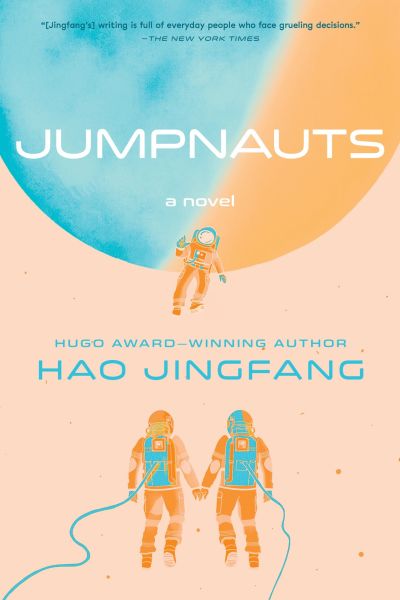From Afar
Jumpnauts
By Hao Jingfang (Translated by Ken Liu)

17 Jul, 2024
Hao Jingfang’s 2021 Jumpnauts is a stand-alone science fiction novel. The 2024 English translation is by Ken Liu.
2080: all across Earth the Pacific League and Atlantic Alliance forces clash. Thus far, defensive technology suffices to fend off most attacks. Nevertheless, escalation seems inevitable, particularly if some new factor were to introduce itself.
Enter aliens.
Jiang Liu is the black sheep of his family. While his relatives work to preserve their hard-won respectability — best not to ask the source of the family fortune — Jiang shuns the family business in favor of facilitating the Tianshang information market. Then Jiang Liu’s interest is caught by astronomy.
Yun Fan’s data shows that certain pulsars are behaving oddly, their spins suddenly slowing. This began with pulsars hundreds of light years from Earth but each new slowing pulsar was closer to Earth than the one before. Jiang Liu’s explanation is that aliens are tapping vast quantities of energy from the pulsars and that there is an alien starship headed towards Earth at nearly the speed of light.
This does not surprise Yun Fan, whose disgraced father believed passionately in aliens. Yun Fan is aware of something few people know: that Qin Shi Huang’s tomb is, among other things, a neutrino detector. Recently it has been detecting more neutrinos. An alien signal?
Yun Fan believes that aliens have been intervening in terrestrial affairs for millennia and that progress shows abrupt accelerations every eight hundred years or so. Now, it seems, the aliens are returning for another visit.
Wartime research can be a chancy thing. League military analysts notice certain radio emissions originating near a base. Espionage? Qi Fei is ordered to find out. Yun Fan’s involvement is an unpleasant surprise, as she is an estranged friend. As for Jiang Liu, Qi Fei takes an immediate dislike, perhaps connected to Jiang Liu’s obvious interest in the attractive Yun Fan.
In surprisingly short order, Qi Fei is recruited into Yun Fan and Jiang Liu’s impromptu CETI project. Jiang Liu has a fair idea of the alien ship’s course. His family can supply a spaceship. Both Jiang Liu and Qi Fei have the mathematical skills needed to navigate. Alas, the project seems doomed, as none of the trio can pilot a spaceship.
Enter Jiang Liu’s friend Chang Tian, bistro owner. In addition to his culinary skills, Chang Tian is a retired ace pilot. Even more conveniently, while pilot skills are vehicle model specific, it happens that the spacecraft Jiang Liu secured is a model Chang Tian knows how to fly.
Success is assured! If the quartet can escape smirking Atlantic Alliance agent Chris Zhao. If the quartet can dodge the volley of space missiles the Alliance sends their way. If the aliens are in fact friendly… which the alien trap-filled starship suggests might not be the case.
~oOo~
Well, this book was dreadful.
It is like Three Body Problem in that one could very easily see it being serialized in Amazing or Astounding seventy-five years ago1. This is not a compliment. Despite references to recent scientific developments, the novel is in many ways surprisingly archaic.
A quick rundown of elements that made this painful, starting with the most trivial:
- Interplanetary speeds are given in kilometers per hour. Just no. I kept having to convert to km/s.
- The scientific and historical backgrounds veer from dubious to grating. Granted, crediting human progress to alien intervention is not new and at least in this case the author isn’t trying to explain away the accomplishments of peoples deemed lesser. The Chinese themselves were beneficiaries of the aliens.
- Are you sick of hearing about the cure-all of blockchain? Avoid this novel. Jingfang sprinkles “blockchain” throughout the book the way Campbell authors sprinkled their tales with “general semantics.”
- The infodumps are interminable. Bear in mind that I say this despite having read and reread way too many Poul Anderson, Lee Correy, and Robert Forward novels.
- The novel is long, giving readers time to bask in the awfulness.
Still, even terrible books have points of interest3.
- There doesn’t seem to be any sort of ideological dispute between the League and the Alliance. Qi Fei favors the League because that’s his side, but that’s about as far as it gets.
- One can see parallels between the Chinese chauvinism in this novel and the American chauvinism seen in so many American SF novels2. However, Jingfang’s is a more nuanced chauvinism than American authors often offered. Some extremely dubious assertions are made about China, but they get pushback.
- Jingfang’s characters are more fleshed out than those offered by American SF seventy-five years ago. At least, the quartet is. Chris Zhao is composed entirely of smirk and malevolence.
- Jingfang, or at least some of her characters, are more pro-democracy than American SF authors seventy-five years ago.
- Some elements of the plot appear to be an attempted rebuttal of Three Body Problem’s central thesis.
None of which compensates for the excruciating experience of reading this interminable novel.
Jumpnauts is available here (Amazon US), here (Amazon Canada), here (Amazon UK), here (Apple Books), here (Barnes & Noble), here (Chapters-Indigo), and here (Words Worth Books).
1: Originally, I had “fifty years” and then I realized 2024 minus 50 only gets us back to the Ford administration.
2: Canadian authors don’t fall prey to pro-Canadian chauvinism because we are above that sort of nonsense.
3: Qin Shi Huang’s portrayal was unexpectedly positive but I’ve encountered that in other Chinese works.
